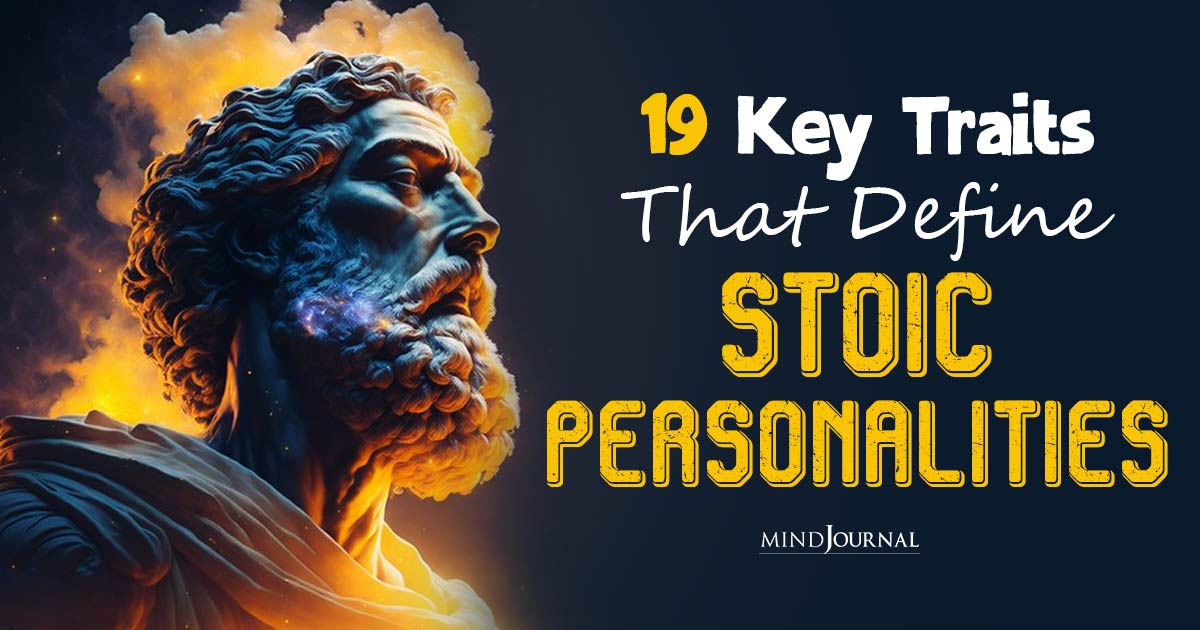Have you ever wondered how some individuals manage to stay calm and composed even in the face of adversity? How do they navigate life’s challenges with a serene sense of inner peace? The answer lies in possessing stoic personality traits. Let’s explore what does it mean to be a stoic and what is a stoic person like.
The philosophy of Stoicism is an ancient school of thought that has endured the test of time and continues to inspire countless individuals today. Let’s understand who is a stoic person, explore stoic personality meaning and what makes a person stoic.
What Does It Mean To Be a Stoic?
Stoicism is a philosophical school of thought that originated in ancient Greece and flourished in ancient Rome, primarily during the 3rd century BCE. It is a philosophy that places a strong emphasis on personal virtue, wisdom, and self-control as a means to achieve a tranquil and contented life.
One of the central tenets of Stoicism is the belief that the highest good is to live a virtuous life. Virtue, according to Stoicism, includes qualities like wisdom, courage, justice, and self-discipline. It is considered the path to true happiness and fulfillment.
So what does it mean to be a stoic? And who is a stoic person? A stoic person is one who maintains emotional calm and rationality in the face of adversity.
Stoicism teaches the concept of indifference to external events. Followers of Stoicism are encouraged to focus on what they can control – their thoughts and actions – and to be indifferent to external circumstances that are beyond their control.
Related: Philosophy 101: 10 Philosophical Concepts To Help You Navigate Life’s Complexities
This principle is often summarized in the famous Stoic maxim: “We cannot control the world, but we can control how we react to it.” This mindset is exactly what makes a person stoic.
Emotional resilience is another key aspect of Stoicism. It emphasizes the importance of acknowledging and understanding one’s emotions without being overwhelmed or controlled by them. This emotional resilience enables individuals to face adversity and hardship with equanimity, fostering a sense of inner peace and tranquility. This is the answer to “who is a stoic person?”
Stoicism continues to be a relevant and influential philosophy, offering valuable insights into how to lead a meaningful and purposeful life.

What is a Stoic Person Like? 19 Common Stoic Personality Traits
Stoicism is not merely a set of principles; it encompasses a way of life. Stoic individuals possess a unique set of personality traits and characteristics that enable them to face life’s ups and downs with unwavering strength and resilience.
Now that we know what does it mean to be a stoic, let’s focus on some of the most common stoic personality traits that can lead to greater peace, clarity, and fulfillment to know what makes a person stoic –
1. Emotional Resilience
Stoics are known for their remarkable emotional resilience. They have the ability to detach themselves from external circumstances and maintain an inner equilibrium.
This doesn’t mean that they are devoid of emotions; rather, they acknowledge their emotions but choose not to let them dictate their actions or state of mind.
Stoics understand that they have control over their own responses and cultivate a sense of tranquility amidst chaos.
2. Acceptance of the Present Moment
A key aspect of Stoicism is the acceptance of the present moment. Stoics recognize that dwelling on the past or worrying about the future is futile. They focus their energy on the here and now, embracing whatever life presents them with.
By accepting the present moment, they free themselves from unnecessary stress and find contentment in the present circumstances.
3. Sense of Inner Freedom
When learning who is a stoic person, we must realize that stoics possess a profound sense of inner freedom. They understand that true freedom lies not in external circumstances but in their ability to control their own thoughts and actions.
Stoic individuals do not allow themselves to be swayed by the opinions of others or by societal pressures. They take responsibility for their own choices and find liberation in aligning their actions with their core values. This is what is a stoic person like.
4. Rationality and Logic
Stoicism places great emphasis on rationality and logic. Stoic individuals possess a keen intellect and strive to approach situations with reason and clarity. They are adept at separating facts from emotions and making sound judgments based on objective analysis.
By using rationality as their guide, Stoics are able to navigate life’s challenges with a balanced and thoughtful perspective. This is the answer to what does it mean to be a stoic.
5. Virtue as the Ultimate Goal
Stoics prioritize virtue as the ultimate goal in life. They believe that true fulfillment and happiness come from living in accordance with moral principles. Stoic individuals strive to cultivate virtues such as courage, wisdom, justice, and temperance in their daily lives.
By aligning their actions with these virtues, they not only find personal fulfillment but also contribute positively to the well-being of society as a whole.
Related: 10 Healthy Ways To Get Through Difficult Times (Insights From Stoic Philosophy)
6. Gratitude and Serenity
Stoic individuals possess a deep sense of gratitude and serenity. They appreciate the simple joys of life and find contentment in what they have rather than constantly striving for more.
Stoics recognize that external possessions and achievements do not define their happiness; instead, they find fulfillment in cultivating inner virtues and living a life of purpose and integrity. This is what makes a person stoic.
7. Flexibility in the Face of Adversity
One of the defining characteristics of stoic personality meaning is their mental flexibility and resilience when faced with challenges. Stoic individuals embrace challenges as opportunities for growth and learning.
They view setbacks as temporary and approach them with a mindset of perseverance and stoic resolve. Rather than succumbing to despair or becoming overwhelmed by difficult circumstances, they maintain their composure and find strength in adversity.
8. Self-Discipline and Self-Mastery
Stoics place great emphasis on self-discipline and self-mastery. They understand that true freedom comes from mastering one’s own desires and impulses. Stoic individuals practice self-control in all aspects of life, whether it be in managing their emotions, resisting temptations, or maintaining a disciplined lifestyle.
Through self-discipline, they cultivate inner strength and become the masters of their own destinies. This clearly addresses what does it mean to be a stoic?
9. Detachment from External Outcomes
Stoics are not attached to external outcomes or circumstances beyond their control. They recognize that they can only control their own thoughts, actions, and attitudes.
Stoic individuals do not allow themselves to be consumed by worry or anxiety over things they cannot change. Instead, they focus their energy on what is within their control and accept the outcomes with equanimity, knowing that they have done their best.
10. Equanimity in the Face of Uncertainty
Stoics exhibit a remarkable sense of equanimity in the face of uncertainty. They understand that life is inherently unpredictable and that they must be prepared for unexpected challenges and changes.
They embrace the impermanence of life and find solace in the stability of their own character and virtue. Now you know what is a stoic person like.
Related: 6 Powerful Ways to Practice Non-Attachment and Find Inner Peace
11. A Focus on Inner Strength
Stoics prioritize the cultivation of inner strength and resilience, according to stoic personality meaning. They recognize that true power lies within, not in external circumstances or possessions. Stoic individuals devote their energy to strengthening their character, developing virtues, and honing their intellectual and emotional faculties.
By nurturing their inner strength, Stoics are better equipped to face life’s trials and tribulations with unwavering courage and resolve.
12. Simplicity and Minimalism
Stoics embrace simplicity and minimalism in their lives. They recognize that excessive attachment to material possessions can lead to discontentment and distraction. Stoic individuals practice detachment from material wealth and instead focus on the essentials.
By living with simplicity, they free themselves from the burden of excessive desires and find greater contentment in a life of moderation and mindfulness. This is one of the primary aspects of what does it mean to be a stoic.
13. Self-Reflection and Contemplation
Stoics engage in regular self-reflection and contemplation. They set aside time for introspection, examining their thoughts, actions, and motivations with honesty and objectivity.
Stoic individuals seek to understand themselves deeply and strive for self-improvement. By engaging in self-reflection, they gain clarity about their values, priorities, and areas for growth, enabling them to make more conscious choices in alignment with their stoic principles.
14. Optimism
Stoics possess a unique form of optimism rooted in resilience and acceptance. They understand that life is not always smooth sailing, but they maintain a positive outlook and an unwavering belief in their ability to overcome challenges.
Stoic individuals embrace hardships as opportunities for growth and view setbacks as temporary obstacles on their journey toward self-improvement. Their optimism is not dependent on external circumstances but stems from an inner conviction and trust in their own capabilities.

15. Compassion and Empathy
Stoics embody compassion and empathy toward others. They recognize the interconnectedness of humanity and the shared struggles and joys that unite us all. Stoic individuals extend kindness, understanding, and support to those around them, even in the face of adversity.
They view compassion as a virtue and understand that by lifting others up, they contribute to the collective well-being of society.
Related: What Is Positive Emotional Detachment and It’s Benefits
16. Adaptability and Flexibility
Stoic personality meaning reveals that stoics embrace adaptability and flexibility in their approach to life. They understand that change is inevitable and that resistance to it only leads to suffering. Stoic individuals cultivate the ability to adapt to new circumstances, adjusting their plans and expectations as needed.
By embracing change with an open mind and a willingness to learn and grow, Stoics navigate life’s transitions with grace and resilience. This is the simplest clarification on what does it mean to be a stoic.
17. Humility and Humbleness
Stoics embody humility and humbleness in their interactions with others and their perception of themselves. They recognize their own limitations and imperfections, acknowledging that they are part of something greater than themselves.
Stoic individuals do not seek recognition or validation from external sources but find fulfillment in living in accordance with their principles and virtues. Their humility allows them to approach life with an open mind, ready to learn from others and embrace new perspectives.
18. Transcendence of Ego
Stoics strive to transcend the limitations of the ego. They recognize that the ego’s desires, attachments, and fears can hinder personal growth and inner peace. Stoic individuals work towards diminishing the influence of the ego by practicing selflessness, detachment, and self-transcendence.
By transcending the ego, they cultivate a deeper connection with their true selves and the world around them, leading to a greater sense of purpose and fulfillment.
19. Self-Awareness
Stoics embrace the practice of mindfulness and self-awareness. They observe their thoughts, emotions, and reactions without judgment.
By cultivating self-awareness, Stoics gain insight into their own patterns of behavior and thought, allowing them to make conscious choices that align with their values and principles.
Takeaway
Knowing what does it mean to be a stoic and incorporating these stoic personality traits and characteristics into our lives can help us develop resilience, inner strength, and a sense of purpose that allows us to thrive in the face of life’s uncertainties.
Stoicism provides us with a timeless framework for personal growth and fulfillment, enabling us to lead lives of greater clarity, resilience, and virtue.
While Stoicism may have originated thousands of years ago, its principles remain as relevant and applicable today as they were in ancient times. So, why not embrace the wisdom of the Stoics and embark on a journey toward a more stoic way of life?
Related: What Is The Main Idea Of Existentialism? Exploring The Philosophy Of Individual Freedom And Choice
Frequently Asked Questions (FAQs):
What are stoic characteristics?
Stoic characteristics include virtue, emotional resilience, indifference to external events, and the pursuit of tranquility through wisdom and self-control.
What personality types are Stoics?
Stoics often possess personality traits like self-discipline, emotional resilience, rationality, and a focus on personal virtue and wisdom.
What is an example of stoic personality?
An example of a stoic personality is someone who remains calm and composed in the face of adversity, valuing inner virtue and wisdom.










Leave a Reply